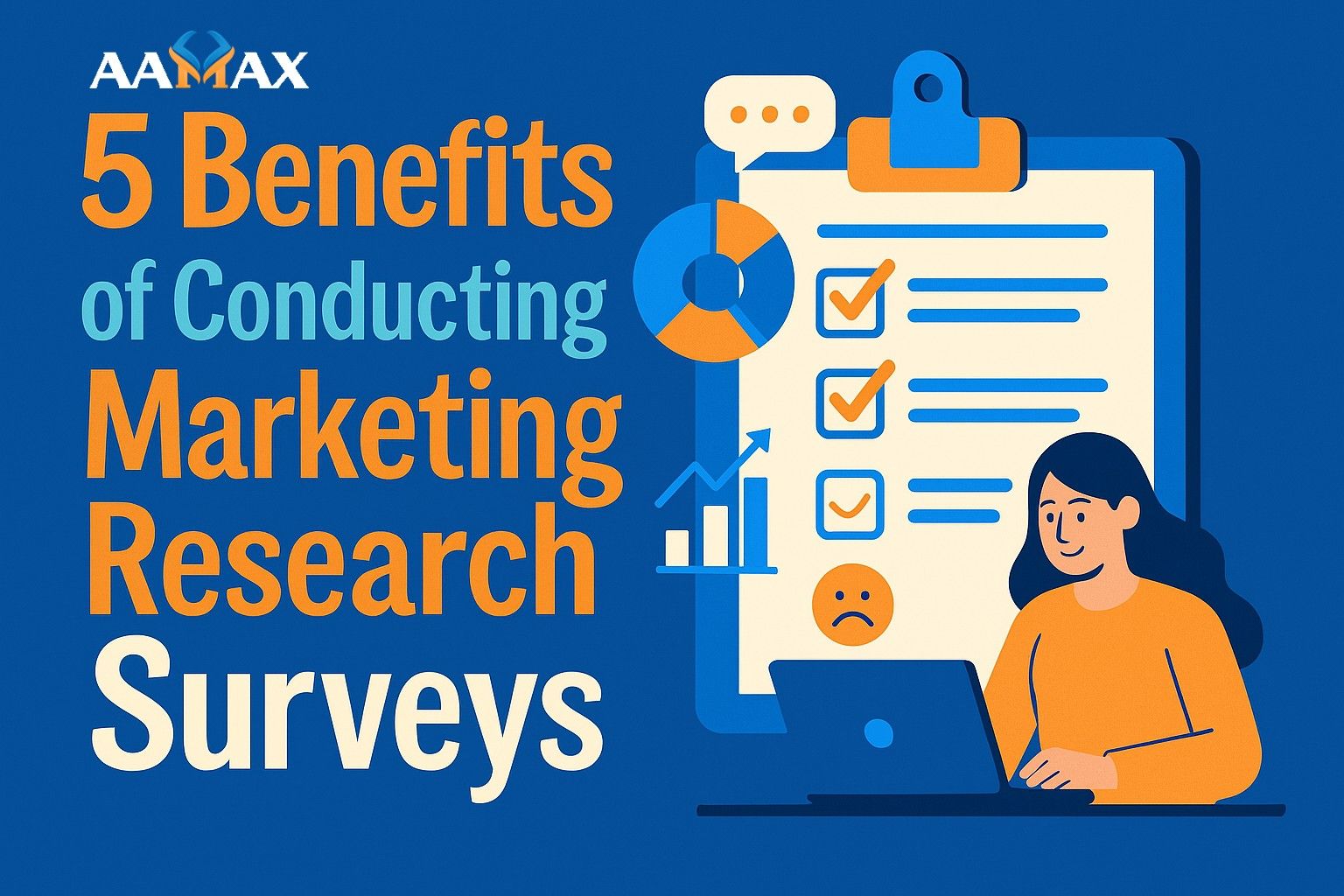
5 Benefits of Conducting Marketing Research Surveys
In the fast-paced digital marketplace, businesses are constantly seeking ways to understand their customers better, predict trends, and improve their strategies. One of the most effective tools for achieving this is Digital Marketing. These surveys provide a direct line to consumer insights, enabling organizations to refine their offerings, strengthen their brand, and remain competitive in an ever-changing environment.
While many business owners understand the general concept of research, they often underestimate how powerful surveys can be when used consistently and strategically. Surveys do not just gather opinions; they generate actionable data that can transform marketing approaches and drive growth.
In this article, we’ll explore the 5 key benefits of conducting marketing research surveys and why they should be an integral part of your marketing strategy.
1. Gaining Deep Insights into Customer Behavior
One of the biggest advantages of marketing research surveys is the ability to understand customer behavior on a deeper level. Businesses often make assumptions about what their customers want, but assumptions can be misleading. Surveys allow you to ask directly and capture authentic insights.
Ways surveys uncover customer behavior:
- Identifying buying motivations: Understand why customers choose one product over another.
- Tracking satisfaction levels: Determine how happy customers are with your products or services.
- Understanding preferences: Learn what features, price points, or service options matter most.
- Evaluating customer pain points: Find out what frustrates customers and how you can solve it.
For instance, a survey may reveal that customers value quick delivery more than discounted pricing. This knowledge helps businesses shift resources to improve logistics instead of focusing solely on pricing.
When customer behavior is clearly understood, marketing messages become more targeted, products become more relevant, and customer loyalty strengthens over time.
2. Improving Decision-Making with Data-Driven Insights
In business, decisions based purely on intuition or guesswork can be risky. Marketing research surveys provide data-backed insights that guide smarter, more strategic decisions. Whether it’s choosing which product to launch, determining the right price point, or selecting the best channel for promotion, survey results eliminate much of the uncertainty.
How surveys improve decision-making:
- Market segmentation: Identify distinct customer groups based on demographics, behaviors, or preferences.
- Product validation: Test new ideas before investing in development and marketing.
- Pricing analysis: Discover what customers are willing to pay.
- Communication strategies: Refine ad messaging to align with customer expectations.
For example, if you’re launching a new mobile app, surveys can help identify which features customers care about most, saving time and money on unnecessary development.
Data-driven decision-making ensures that every dollar spent on marketing or product development goes further because it aligns with real customer needs.
3. Strengthening Customer Relationships and Engagement
Marketing research surveys are not just about collecting data—they’re also a form of customer engagement. When businesses take the time to ask for opinions, customers feel valued and heard. This interaction itself can strengthen trust and foster stronger relationships.
Benefits of using surveys for relationship-building:
- Customers feel recognized: People appreciate when brands care about their feedback.
- Opportunity for two-way communication: Surveys create a dialogue, not just a one-way sales pitch.
- Building loyalty: Engaged customers are more likely to stick with a brand that listens to them.
- Personalization: Insights from surveys allow businesses to customize experiences and offers.
Additionally, responding to survey results publicly—such as announcing changes based on customer feedback—shows transparency and authenticity. This creates an even deeper bond between the business and its audience.
In a marketplace where brand loyalty is hard to earn, surveys help businesses stand out by showing that they prioritize customer voices.
4. Identifying Market Trends and Staying Competitive
Markets evolve rapidly. What works today may not work tomorrow, and businesses that fail to adapt risk falling behind. Marketing research surveys help companies identify emerging trends and adapt their strategies to remain competitive.
How surveys help spot trends:
- Tracking changes in consumer preferences over time.
- Identifying new product or service opportunities.
- Discovering gaps in the market where competitors are failing.
- Understanding how external factors (like economic changes) affect customer behavior.
For example, surveys conducted during the rise of e-commerce revealed that customers valued convenience over in-store experiences. Brands that acted quickly to strengthen their online presence thrived, while others lagged.
By regularly conducting surveys, businesses can anticipate shifts in customer needs and pivot before competitors catch up. This agility is often what separates market leaders from followers.
5. Enhancing Marketing Campaign Effectiveness
Another major benefit of conducting marketing research surveys is the ability to optimize campaigns. By gathering customer input before, during, and after a campaign, businesses can measure effectiveness and continuously improve results.
Ways surveys improve campaigns:
- Pre-campaign testing: Test ad concepts, messaging, or visuals with small audiences.
- Mid-campaign feedback: Gauge audience reactions and make real-time adjustments.
- Post-campaign analysis: Measure customer awareness, satisfaction, and conversion rates.
- Identifying missed opportunities: Learn what didn’t resonate and why.
Imagine spending thousands on a marketing campaign only to realize later that the message didn’t connect with your audience. Surveys help prevent wasted budgets by validating strategies in advance and offering feedback during execution.
Ultimately, campaigns informed by survey data are more likely to hit the right tone, reach the right audience, and deliver better ROI.
Practical Tips for Conducting Effective Marketing Research Surveys
Now that we’ve explored the benefits, it’s important to understand how to make surveys effective. Poorly designed surveys can produce misleading results, while well-crafted surveys provide powerful insights.
Tips for success:
- Keep surveys short and focused—customers are more likely to complete them.
- Ask clear, unbiased questions that don’t lead respondents toward a certain answer.
- Use a mix of multiple-choice and open-ended questions.
- Offer incentives for participation, such as discounts or giveaways.
- Analyze results quickly and take action—customers want to see their feedback matter.
Leveraging technology like email surveys, website pop-ups, or mobile app questionnaires makes data collection easier and more efficient.
Wrapping It All Up
Marketing research surveys are not just a nice-to-have; they are essential for businesses that want to thrive in today’s competitive marketplace. By conducting them regularly, companies gain insights into customer behavior, improve decision-making, build stronger relationships, identify market trends, and optimize campaigns.
The insights gathered from surveys can transform business strategies and create sustainable growth. But remember, surveys are only as valuable as the action taken from their results. Businesses that listen, adapt, and evolve based on customer feedback will always be better positioned for success.
If you’re looking to enhance your digital presence while building customer trust, you need a strong online foundation to complement your survey insights. For expert help in web development, digital marketing, and SEO services, you can AAMAX. As a full-service digital marketing company, AAMAX ensures your business is equipped with the tools and strategies to turn research into real results.
By integrating marketing research surveys into your broader strategy, you won’t just be keeping up with customer needs—you’ll be anticipating them, staying competitive, and building lasting brand success.







